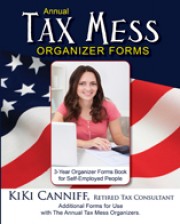New Editions and 3-Year Forms Book Make Saving on Taxes Easier for Self-Employed People

Keizer, OR, February 26, 2016 (Newswire.com) - The current edition of a 9-book series of Annual Tax Mess Organizers for independent contractors and self-employed people now includes forms plus there is now a 3-year record-keeping forms book filled with the same organizational forms. The Annual Tax Mess Organizer Forms; 3-Year Organizer Forms Book For Self-Employed People works with any title in this series including those for hair stylists and barbers, massage therapists, home party sales reps, writers, artists, manicurists, building trade workers and others.
The forms book and is now available for older editions and the businesses' future years. A person can take these forms to their tax professional or use them to complete their own taxes. Instructions for filing your own business taxes is included in the Annual Tax Mess volume for your industry as well as the basic book.
"Know which expenses are considered 'normal and necessary' for your industry and track every penny that you spend. You'll miss less of what you're allowed to deduct if you do, and any business expenses can be deducted to offset your business income."
KiKi Canniff, Author
The lead title in this updated series, Annual Tax Mess Organizer For Self-Employed People & Independent Contractors, is an all-inclusive book. Seven industry-specific organizers are also available for independent contractors and all books were updated for 2016. These books teach self-employed people how to do their taxes right. Included in each book are ways you can use the IRS and your small business to your advantage and pay less taxes. Here are six of the tips you'll learn:
1. Always run a business bank account since depositing into your personal account leaves it open to the IRS.
2. Never gift or donate; advertise instead. A business is only allowed one $25 gift per client, donations go on your personal form if you're not incorporated, but you can expense all advertising done for your business right on your Schedule C.
3. You should track every single business mile you drive for your business. This is often a big expense for a small business so it's important to consider every trip as well as commuting mileage to your second job. This may include self-employment if you qualify.
4. Know which expenses are considered 'normal and necessary' for your industry and track every penny you spend. You'll miss less of what you're allowed to deduct if you do.
5. Invest as much money as you can for your retirement. A business owner can save up to 25% of their compensation toward retirement with the right account.
6. Go after the IRS to change the current tax laws for your industry to your benefit. Join an industry group first. This worked for other industries and it will work for you.
An Annual Tax Mess Organizer teaches self-employed individuals this plus what they can and cannot deduct, how to quickly sort receipts, track tips, document income, handle inventory, produce audit-proof records and create a simple annual report with all of the numbers necessary to prepare a Schedule C tax return.
With any of these books you’ll have a year’s worth of business records organized in less than 4 hours; the organizational forms book lets you do it for an additional 3-years. The author is a retired tax consultant whose books make IRS tax laws easy to understand. All of Canniff's books are available from Amazon.com.